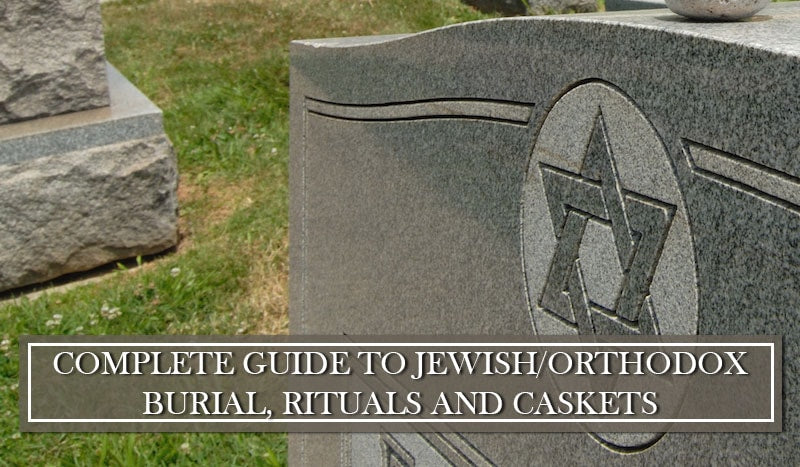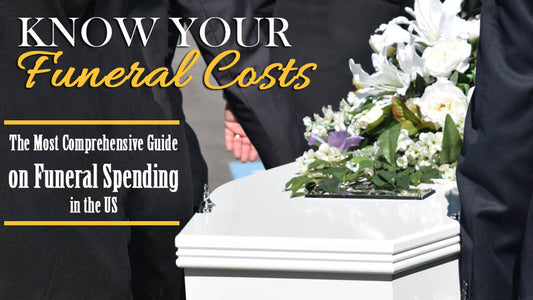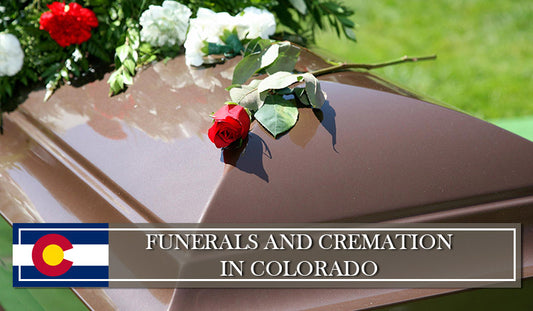
Complete Guide to Jewish/Orthodox Burial, Rituals and Caskets
Powerful customs and beliefs based on Torah have always been used for having Jewish funerals. The views are still strong for the Conservative and Orthodox Jewish cultures, but some traditional rituals have been modified with Reform Judaism. Jewish people believe that one should live life while accepting the inevitability of death. Leading a life by the Jewish law will prepare one for the afterlife, even if the definition of afterlife isn't apparent to many.
How do religious values affect the Orthodox/Jewish casket?
In Judaism, the body has to return to the earth as soon as possible, which is why the Jewish law asks for a basic casket.

It will be a natural decomposition of wood, whereas the metal casket will stop the body from going back to the ground. Metal nails and handles may be utilized, but conventional caskets should be made with wooden pegs, and a very minimal or unlined interior. Some caskets may even have four holes in the bottom so that the body goes back to the earth faster.
Which type of wood should be used for the casket?
The type of wood isn't essential for the Jewish/orthodox casket. A plain pine box is typical in some regions, whereas a poplar or redwood casket is more prevalent in others. The wood may be used in natural form, or it can be polished. It’s possible to decorate the casket, but not much.

How to choose a casket for the Jewish/orthodox funeral?
Choosing a casket is never easy, especially if the death was sudden. Many funeral homes feature a "casket room," with the display area, including a great diversity of models where prices range from $1000 to $10,000. Nowadays, you can buy caskets online at much more affordable price. It all depends on how much you want to spend on the funeral container. You can easily check how much do caskets cost from your home or mobile device any time. Online caskets companies like Trusted Caskets offers the budged friendly casket options.
Rabbinic authorities strongly believe that only simple and modest caskets should be used, reflecting the importance of democracy in death. Also, a simple casket means lower expenses for the funerals. As we’ve mentioned, the casket prices cover a vast range, but you can find beautiful and straightforward wooden caskets for about a thousand of dollars, especially when buying them online. According to the rabbinic authorities, it’s wiser to donate money to the charity rather than spend thousands on extravagant caskets.
One of the examples of traditional Orthodox Jewish Casket is the "Daniel" Casket, this Jewish Casket on the picture below:
See it in our online store
How do Jewish burial caskets stand out?
The Jewish burial casket, also named Aaron, is a vessel made to transport the body to the earth, returning to it most naturally.
Here are the mandatory requirements for Jewish caskets, as they have to be made according to the Jewish law and consideration to the ancient traditions:
- Caskets have to be made of natural and biodegradable materials.
- The caskets cannot be done on the Sabbath (Saturday)
- Typically, the caskets are made of wood, with no metal parts.
- The design should be simple, with no embellishment, as the casket is a reminder of how all people are equal at death.
- Various types of wood can be used, but pinewood, poplar and redwood make the most popular choice. However, any wood is accepted.
- Only simple interior is allowed to use, no mattress.
- The exterior may be plain or polished.
- Only the body and some earth from Israel will be placed inside the casket.
With Jewish funeral, it’s also essential that the body touches the ground, somehow. With cemeteries requiring the use of casket, there are various ways of following the tradition. Holes may be drilled in the bottom of the casket, whereas families may also put some earth into the casket. The earth may be from Israel or the cemetery grounds.
Where do people buy Jewish Burial caskets?
Typically, people buy Jewish burial caskets within the local funeral home. These days it could be a good idea to check the online casket providers, who often offer the best casket prices on the Jewish caskets.
Should you be part of the Jewish community, you will have to get in touch with the local synagogue, rabbi, or the funeral home. They’re the professionals who may guide you on the steps you have to take for purchasing the proper casket.
You don’t always have the means to follow the Jewish traditions, especially if you’re trying to cut down the funeral spending. Sometimes, you may want to have a special casket, without compromising on the simple principles of Jewish tradition. It’s where the Internet becomes a great source of inspiration.
There are many places to buy Jewish burial caskets online, and you may choose from a significant number of craftsman shops, large distributors, and manufacturers.
What can be buried along with the body of the deceased?
Tradition recommends burying the body directly, only with some earth from Israel, the Holy Land for the Jewish people. The deceased’s tallit (prayer shawl) may also be placed in the casket. Regardless of the principles, some families will place subtle remembrance tokens inside the casket, mostly letters or photos.
Is Orthodox Judaism different regarding the funeral rituals?

Orthodox Judaism requests complete adherence to the sacred funeral and burial traditions. According to their values, resurrection of the body will take place, and physical life will occur after death at some point. The resurrection will take place after the Messiah comes. The interim, which are the righteous souls, will benefit from the pleasures of Olam ha’bah.
What funeral rituals take place?
The friends and extended family will collaborate for cooking the first meal for the deceased's immediate family members. The food must be kosher, as non-kosher foods cannot be used at a kosher home. The rituals have changed over the years, and it’s also common for close friends to send flowers to the family, but it’s not a custom for the Orthodox Jews. It’s important to highlight that sending flowers to Jewish mourners or to the funeral home is considered to be out of place. Monetary gifts of tzedakah are offered to charities, honoring the deceased.
With the Jewish community, it’s tradition to prepare and bury the body. Warm water is used to wash the body by dedicated members of the Jewish community, who make sure that the body never rests facing down.
How Long Is a Jewish/Orthodox Funeral? - The funeral services are rather simple and typically last from 15 minutes to one hour. It’s believed that there are no differences between people in both life and death. No music and no flowers are used at the Jewish funeral services.
Should you want to make condolence calls to an Orthodox Jewish family, you shouldn’t do it in the first days of mourning (the Shivah), nor on Shabbat.
Typically, funeral services don’t take place inside the Orthodox Jewish synagogues, but in chapels at mortuaries. They can also take place at home, with men and women sitting side by side.
Is there embalming?
Jewish law is very strict about burying the body right after death. Only a basic wooden casket may be used for burial within Jewish community. Embalming is never used, and open casket burial isn’t approved of either. You will never see an open casket at Orthodox Jewish funerals. Due to traditions and religion, the burial should be done 24 hours after the death. Because of that, the casket needs to be ordered ahead of time or using overnight caskets delivery provided by Trusted Caskets. Of cause, our days are not all the people strictly follow the old traditions, and often Jewish funerals can be held within several days after death.
Why isn't an open casket allowed?
Jewish funeral with open casket is something you see in extremely rare situations. Viewing of the deceased is essential for other cultures, giving a feeling of closure to family and friends. However, in the Jewish culture, public viewing of the dead appears like disrespecting the deceased’s modesty. Mourners can see the body, but the deceased cannot do the same.
At some level, the burial vigil of the body (Shirah) replaces the deceased's typical viewing. With traditional Jewish burial, the body isn't dressed but covered with a shroud. The casket is closed throughout the funeral, as the family and friends participate in the ceremony. The belief is that the body will decompose, which is why "green burial” and traditional Jewish burials are similar. Some Jews think that decomposition is the last phase of separating the body from the soul.
After the funeral is done, the tradition requires the close friends and immediate family members to return to the mourner’s place. For seven days after burial, members from the Jewish community will pay them a visit as Shivah services take place. Mourners will not leave home, not even for social or work activities throughout the seven days.
Jewish burial and “green burial” - what are the similarities?
Jewish burial rituals resemble the eco-friendly, green burials a lot. More and more people become aware of the damage made by "traditional" funeral rituals to the environment, choosing simpler and bio-degradable caskets like Jewish people have been using for centuries.
While Jewish people have been protecting the environment with the wooden and bio-degradable caskets for centuries, it’s only now that modern people become aware of how they may protect the earth in life and death.
Blog Author: Tim




